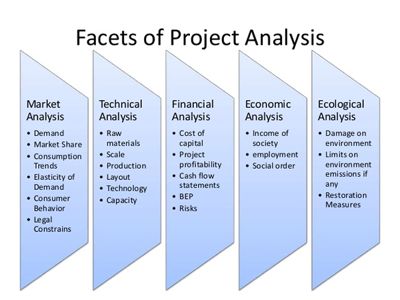A project is temporary in that it has a defined beginning and end in time, and therefore defined scope and resources.
Facet analysis is the process of breaking down a subject into its component parts, choosing appropriate terminology to express those parts, and conveying those aspects by means of a notational device (Spiteri, 1998).
Facets of project analysis: The important facets of project analysis are:-
- Market analysis: Market analysis is concerned primarily two questions:
- What would be the aggregate demand of the proposed product or service in future?
- What would be the market share of the project under appraisal?
To answer the above questions, the market analyst requires a wide variety of information and appropriate forecasting method.

- Technical analysis: Analysis of the technical and engineering aspects of the project needs to be done continually when a project is formulated. Technical analysis seeks to determine whether the prerequisites for the success full commissioning of the project have been considered and reasonably good choices have been made.
- Financial analysis: Financial analysis seeks to ascertain whether the proposed project will be financially viable in the sense of being able to meet the burden of servicing debt and whether the proposed project will satisfy the return expectations of those who provide the capital.
- Economic analysis: Economic analysis also referred to as social cost-benefit analysis is conceded with judging a project from the larger social point of view. In such an evaluation the focus is on the social cost and benefits of a project which may often be different from its monetary costs and benefits.
- Ecological analysis: In recent years, environmental concerns have assumed a great deal of significance and rightly so. An ecological analysis should be done particularly for major projects which significant ecological implications and environmental polluting industries.















